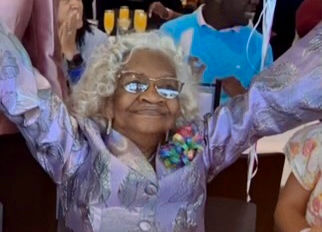Erykah Badu’s Unspoken Tribute to Sara Baartman: A Reflection on the Legacy of Black Women’s Bodies
- April B. Love

- Apr 1
- 4 min read

Erykah Badu’s recent unspoken, but potential tribute to Sara Baartman has sparked important conversations around the exploitation, objectification, and dehumanization of Black women, especially in relation to the way society views and fetishizes their bodies. Known for her powerful music, thought-provoking lyrics, and activism, Badu’s unspoken tribute serves as a poignant reminder of the painful history that Black women, particularly those with curvier bodies, have endured. But it also offers a moment to reflect on the progress and the work still to be done in dismantling harmful stereotypes and reclaiming power over one’s body.
Who Was Sara Baartman?
Sara Baartman was a Khoikhoi woman from South Africa who became a symbol of exploitation in the early 19th century. In the late 1700s, she was brought to England by a British ship’s captain, where she was exhibited as a freak show attraction due to her physical appearance, particularly her prominent buttocks. This exhibition, which took place in the infamous “circus of human oddities” in London, was presented as scientific curiosity, with her body being scrutinized as something abnormal and exotic.
Baartman’s story is emblematic of the colonial exploitation of African bodies, and her physical form became the subject of ridicule and dehumanization. The treatment she received was rooted in racist and xenophobic ideologies, where European colonizers used her body as a way to reinforce their own sense of superiority while reducing her humanity to mere spectacle. She was mocked and objectified, viewed not as a person, but as a thing—an object for consumption and display.
Baartman’s time in England was traumatic, but things became even worse when she was taken to France after her death in 1815. Following her passing, her body was dissected and her remains were put on display in Parisian museums, where her genitalia and preserved remains were studied by scientists. It wasn’t until the late 20th century that Baartman’s remains were returned to South Africa, a tragic chapter in history that highlights the extreme lengths to which colonial powers went to assert dominance over African bodies.
The Objectification of Black Women’s Bodies
Baartman’s story is not an isolated incident. The fetishization and objectification of Black women’s bodies have been ongoing struggles throughout history. Particularly the “exotic” and “hyper-sexualized” portrayal of Black women’s bodies, especially those with fuller figures and large buttocks, has been normalized in mainstream culture. This objectification is rooted in the same colonial mentality that dehumanized women like Baartman centuries ago.
Today, the focus on Black women’s bodies, particularly their curves and “full” figures, is often both a form of commodification and appropriation. Celebrities like the Kardashians, for example, have been criticized for appropriating Black women’s natural physiques, especially their larger buttocks, while ignoring the historical context in which these bodies were once demonized. What once made Black women the subject of mockery and disdain has now been commodified, creating a paradox where their bodies are both fetishized and marginalized.
This commodification of Black women’s bodies, specifically their large buttocks, often ignores the real pain and trauma that Black women have faced for centuries because of how they are seen and treated. This phenomenon has permeated everything from music videos to social media, where a very specific ideal of beauty that is rooted in racial stereotypes continues to be perpetuated.
The Emotional and Cultural Weight of Erykah Badu’s Tribute
In her recent tribute, Erykah Badu not only shed light on the painful history of how Black women’s bodies have been treated but also sparked a broader conversation about reclaiming power and agency over one’s physicality. For Badu, this is more than just about Baartman; it is a commentary on the continued exploitation and hypersexualization of Black women in the modern era.
Badu, known for her boundary-pushing art and unapologetic activism, has always been vocal about issues surrounding race, gender, and identity. She has used her platform to challenge the mainstream narrative around beauty and self-worth, often calling out society for reducing women—especially Black women—to their physical attributes. In acknowledging Sara Baartman’s legacy, Badu’s tribute is an act of resistance against the objectification that has been perpetuated for centuries. It’s a reclamation of self, a declaration that Black women, their bodies, and their experiences are worth more than the superficial attention they often receive.
Badu encourages Black women to embrace their bodies, with all their natural beauty, in a world that continues to tell them they are not enough. Through her music and art, Badu champions the idea that Black women deserve to be seen as complete human beings—not merely for the size of their hips or the curve of their backs, but for their intellect, creativity, strength, and spirit.
Reclaiming the Narrative
Erykah Badu’s unspoken tribute to Sara Baartman is a crucial part of the ongoing effort to reclaim the narrative surrounding Black women’s bodies. Baartman’s life and legacy should not be reduced to the exploitation she endured, nor should the stereotypical focus on Black women’s physicality continue to be the measure of their value. The story of Sara Baartman is a painful reminder of the past, but also a call for Black women everywhere to take control of their own identities and to push back against the harmful objectification that still exists.
As the conversation around the treatment of Black women’s bodies continues to evolve, it is essential that we honor the lives and stories of those like Sara Baartman and recognize the resilience of Black women throughout history. Through art, activism, and love, the fight for the dignity and respect of Black women’s bodies goes on, and Badu’s tribute serves as a vital reminder of the power of reclaiming one’s story and standing in full humanity.




Comments